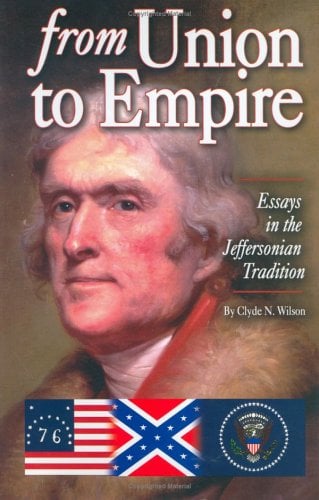Dr. Clyde Wilson’s new gathering will be of particular interest to readers of this journal, as some parts of it have appeared in these pages and as he has for years maintained a special relationship with Chronicles. Yet I hasten to add that the compelling quality of these essays speaks broadly to the most vital issues of our national identity and history and to the self-understanding of Americans as expressed in our politics—and, even more, to the self-awareness of Americans that cannot, or should not, be expressed in politics.
Written from 1969 to 2001, these articles, essays, reviews, and lesser pieces express a consistent, surprising, and productive point of view. They are consistent not only in the continuity of the author’s identity but, more importantly, in his speaking from principle; surprising in their applicability to the contemporary era. And they are productive because, no matter the provocation, Wilson’s counsels are not of despair. Clyde Wilson knows too well that optimism and pessimism, though not determinative, are in some way self-fulfilling prophecies. That “Death by Melancholy” once identified by Walter Sullivan, the pessimism that is rooted in the blessing and curse of knowledge, can only be averted finally by the maintenance of faith, however distressed such faith may be. Wilson keeps the faith, no matter what.
The base of Clyde Wilson’s knowledge (though by no means its limit) is as an historian and an Americanist; his center is the South. A professor of history at the University of South Carolina, he is the editor of the 28-volume edition of The Papers of John C. Calhoun, as well as the editor and author of other books. He has for more than three decades articulated a perspective that, though unique, is not unrelated to those of such notables as Richard M. Weaver, James Burnham, Russell Kirk, M.E. Bradford, Forrest McDonald, and Samuel Francis, who are subjects of various of his pieces.
The point of view that Wilson upholds with informed knowledge and articulated reason is the one he identifies as Jeffersonian and we may call localist, particularist, democratic, and republican. His point is made when we understand that the term federalism has come to mean the opposite of its historical denotation and that democrat and republican signify something more—and other—than the names, respectively, of self-serving factional elites; or more and other than euphemisms for pandering demagogues, on the one hand, or pandering plutocrats, on the other. Alternatively, we might say that his point is made when we begin to understand the Constitution and our relation to it, and how it has become the arcane totem of various witch doctors, such as those on the Supreme Court who recently found constitutional sanction for affirmative action and sodomy. Interpretation of the Constitution has become so uncannily attuned to the whining of identity groups that it is no wonder that nominations to the Supreme Court have been grossly politicized. But that is just the point: The mystification of the Constitution has been a necessary part of our slide into abstract politics for a long time. Yet if we as citizens or as subjects cannot even read our own Constitution, that has not deterred Clyde Wilson from engaging it on its own grounds.
Having been instructed for years in the national journals and the better newspapers that ours is “a proposition nation,” we might be shocked (if we did not know better) to discover that it is no such thing. And the reiteration of other suppressed truths might be shocking as well. My favorite passage is this one:
It would astound our politicians today to learn that at the time of the Founders and even long after, people held public office for the honor and that in most cases, rather than filling their own snouts at the public trough . . . they actually made a sacrifice of their private interests to serve in public office. The Constitution presupposed an aristocratic rather than a bourgeois class of office holders and aspirants . . . who would always be capable of independent judgment. That is, the operation of the Constitution rested in part on something that has ceased to exist.
Yet this does not necessarily mean that the Constitution can never again rest on a class of independent minds uncorrupted by bribery and unclouded by ideological obsession. To achieve such a deliverance from the present thralldom, Americans must return to electing to office Jeffersonian “natural aristocrats” rather than the overly familiar rascals and mountebanks of more recent times. If I have understood him, Wilson still believes that a return to a properly understood federalism and a concomitant revival of states’ rights could restore not only the balance of government but even the balance between the public and the private realms. And again, if I have understood him, Wilson has indicated that the Republican Party has proved to be the treacherous instrument for pursuing any such restoration and regeneration of a healthy body politic.
There is much more to be considered and absorbed from this book. How refreshing it is to see Alexander Hamilton dispatched with such panache—and James Madison, as well. The opposite approach to John Taylor, George Mason, Nathaniel Macon, and St. George Tucker is most enlightening and useful in creating or reasserting a usable past that actually aims at ameliorating contemporary problems, rather than exacerbating them further.
Upon due consideration, I think that From Union to Empire is a book that any American could read with profit and pleasure. And I see it as the ideal gift for any young person perplexed by what the late Andrew Lytle called “the present confusion.” Graced with informed perspective, humor, and surprising conclusions, these essays have convinced me that what this country needs is less of Woodrow, and more of Clyde, Wilson.
[From Union to Empire: Essays in the Jeffersonian Tradition, by Clyde N. Wilson (Columbia, SC: The Foundation for American Education) 343 pp., $24.95]

Leave a Reply